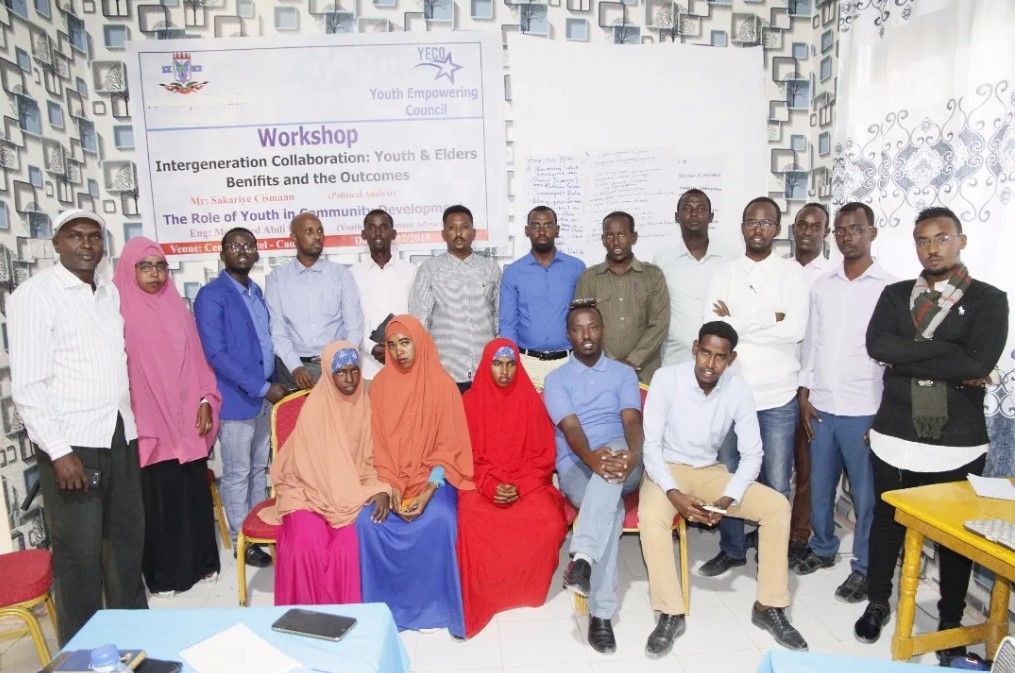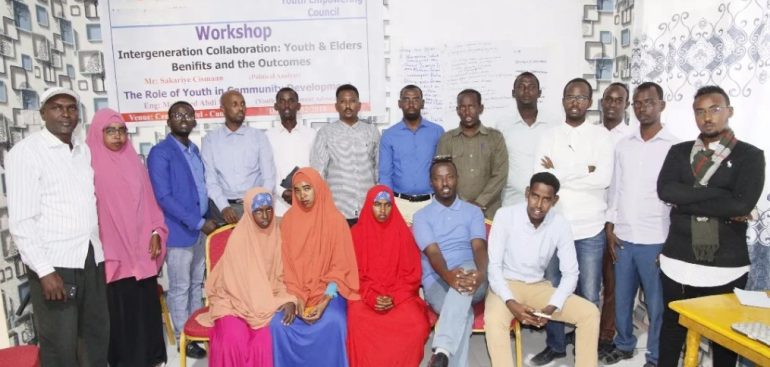The training workshop took place at Central Hotel in Cadaado on Thursday, February 15th, from 9:30 AM to 12:00 PM.
Training Team:
The team arrived at the venue two hours before the session to allow ample time for preparation and printing of the agreed agenda. The team consisted of six members:
1. Sakariye Cismaan (Trainer)
2. Mohamed Abdullahi (Mediator)
3. Abdurahman Roble (Facilitator)
4. Sakariye Abdullahi (Facilitator)
5. Sahnun Ahmed (Cameraman)
Agenda:
The training team collaboratively developed the following draft agenda:
9:30 AM – 10:00 AM: Introduction
10:00 AM – 10:15 AM: Definition of intergenerational dialogue
10:15 AM – 10:30 AM: Historical background of intergenerational dialogue
10:30 AM – 10:40 AM: Types of likely cooperation
10:40 AM – 11:00 AM: Columbia: A case study
11:00 AM – 11:15 AM: Benefits of intergenerational dialogue
11:15 AM – 11:20 AM: Thoughts from participating elders
11:20 AM – 11:50 AM: Focus group discussions
11:50 AM – 12:00 PM: Conclusions and recommendations
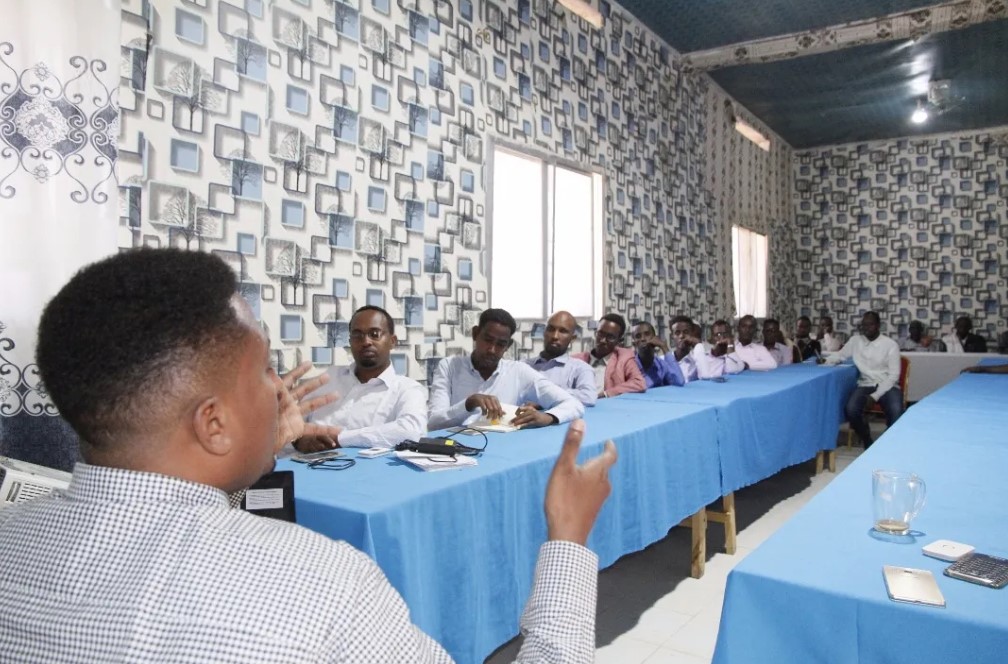
The workshop saw the participation of 34 attendees, predominantly from SIMAD University Learning Center in Cadaado, Horn of Africa University, local youth members, and five representatives from the local traditional elders.
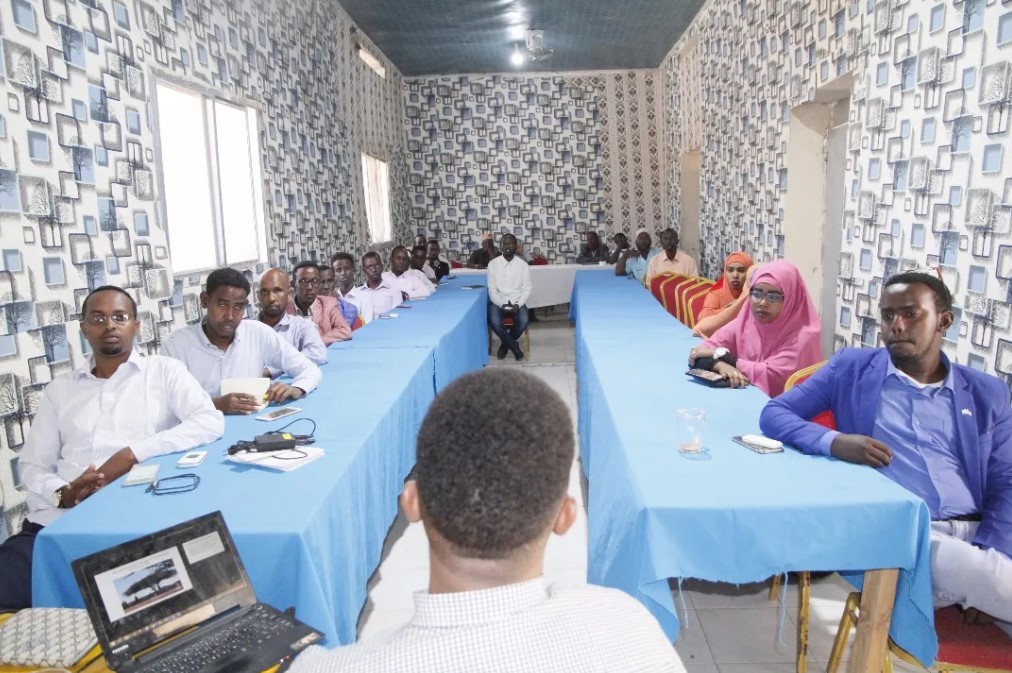
Participants listen carefully as they took part on Inter-generational Dialogue in Cadaado at Central Hotel on 15/02/2018. Photo by Sahnun Ahmed
The training workshop session
During the training workshop session, Ahmed Abdi, the Executive Director of YECO Somalia, inaugurated the session and expressed gratitude to the attendees for their active involvement and eagerness to engage in meaningful discussions within their community.
Sakariye Cismaan, the trainer, then delivered a presentation on intergenerational dialogue, emphasizing its benefits and potential outcomes. The session defined intergenerational dialogue as the exchange of personal experiences between elders and youth, with the aim of promoting community welfare.
Mr. Cismaan highlighted the significant number of Somali youth, approximately 7 million based on a preliminary census, constituting 75% of the country’s population. However, he noted that youth are often excluded and overlooked in decision-making processes.
The session explored the reasons behind this exclusion, including the traditional reliance on elders for conflict resolution through mediation models, which led to limited consultation with young people.
Using Columbia’s war on drugs as a case study, Mr. Cismaan demonstrated how intergenerational dialogue played a role in reducing violence. He proposed that Somalia could replicate this approach to contribute to the resolution of ongoing conflicts.
The trainer listed several benefits of intergenerational dialogue, including the prevention of repeated mistakes through the “experience filter,” the development of youth leadership skills through learning from experienced elders, and reducing youth recruitment by armed groups, thereby contributing to sustainable and lasting peace.
The unity between youth and elders was emphasized as a crucial factor, as it enables them to have a collective voice and address community concerns, such as the refusal of the Somali Shilling by some businesses in central Somalia, acquiring firefighting equipment for Cadaado, and eliminating illegal roadblocks. Additionally, intergenerational dialogue can hold district authorities and government officials accountable.
The training session also discussed the potential types of cooperation between youth and elders, such as engaging in debates and analysis of Somalia’s federal system, studying the draft constitution, or assisting elders in drafting and translating press releases and communiques.
Focus Group Discussions
Focus group discussions were conducted, with participants divided into three teams to brainstorm and address two challenges:
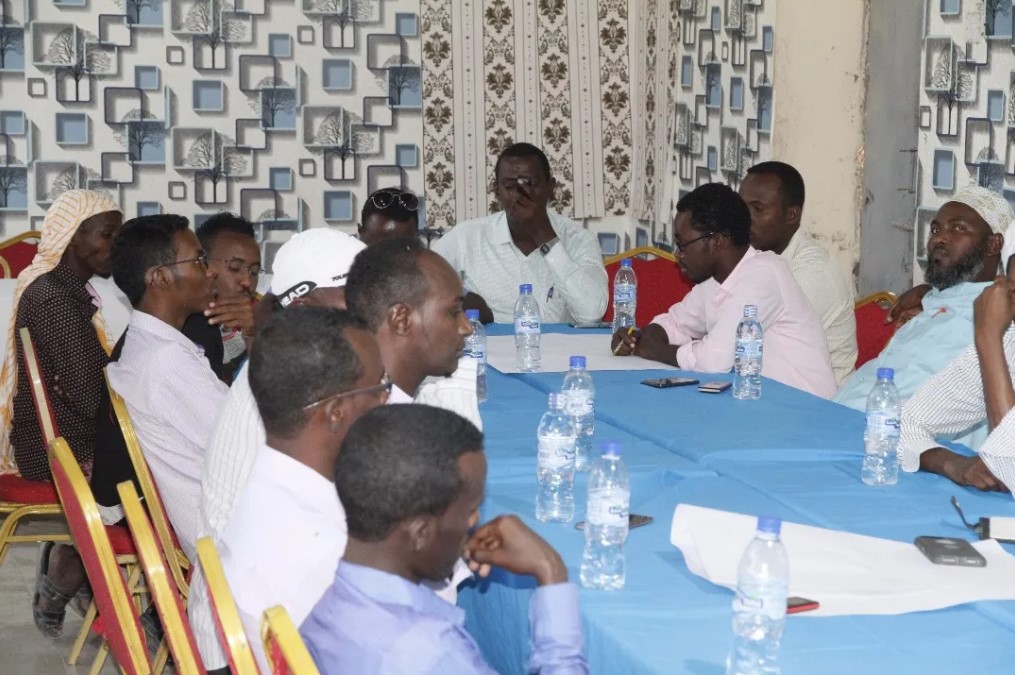
Challenge 1: Key advantages of intergenerational cooperation.
Compiled results:
Results included receiving guidance and advice from elders, enhancing community stability and development, promoting political stability and confidence among community members, fostering collaboration between youth and elders, and enabling effective and inclusive decision-making with long-term vision.
Challenge 2: Reasons for the youth’s lack of voice in Somalia.
Compiled results:
Results highlighted lack of unity among Somali youth, traditional neglect of youth prospects by older generations, limited awareness of their own power, lack of self-confidence, and negative impacts from emerging regional states and the 4.5 political power-sharing system, which divides the youth based on clans.
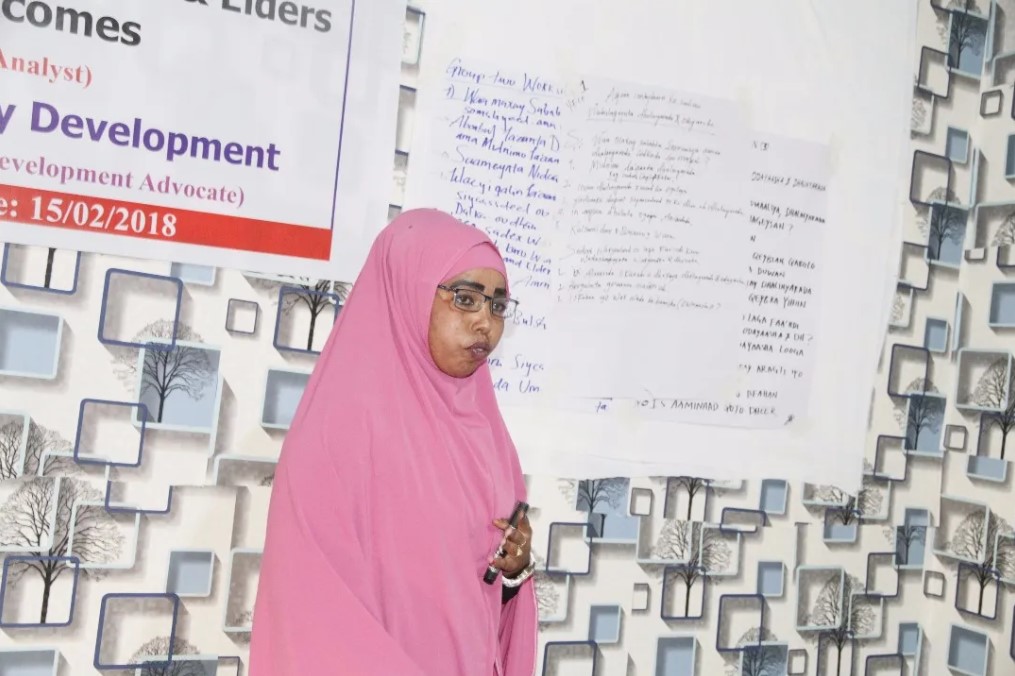
Training Workshop participants discuss as focus groups on given challenges. Photo by Sahnun Ahmed
Training Workshop participants discuss as focus groups on given challenges. Photo by Sahnun Ahmed
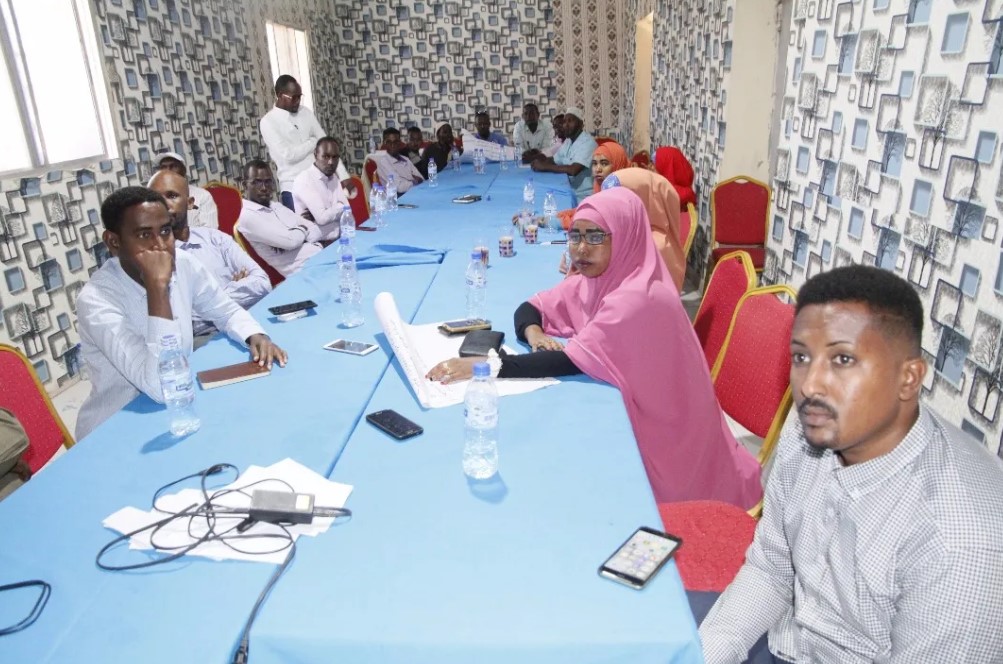
Maria Ladan Wardhere gives a clarified presentation from her group’s opinion to the participants. Photo by Sahnun Ahmed
Duran Olad gives detailed analysis from his group as they brainstormed for the two given challenges. Photo by Sahnun Ahmed
Abdirahman Roble takes his turn to reveal what they have discussed as group three by explaining clearly everything from their opinion. Photo by Sahnun Ahmed
Recommendations
Establishment of elders and youth council, which will serve as a meeting point where elders and youths exchange ideas, and also serve as the true representative of the community. The council will have a known spokesman that can easily get the attention of the media.
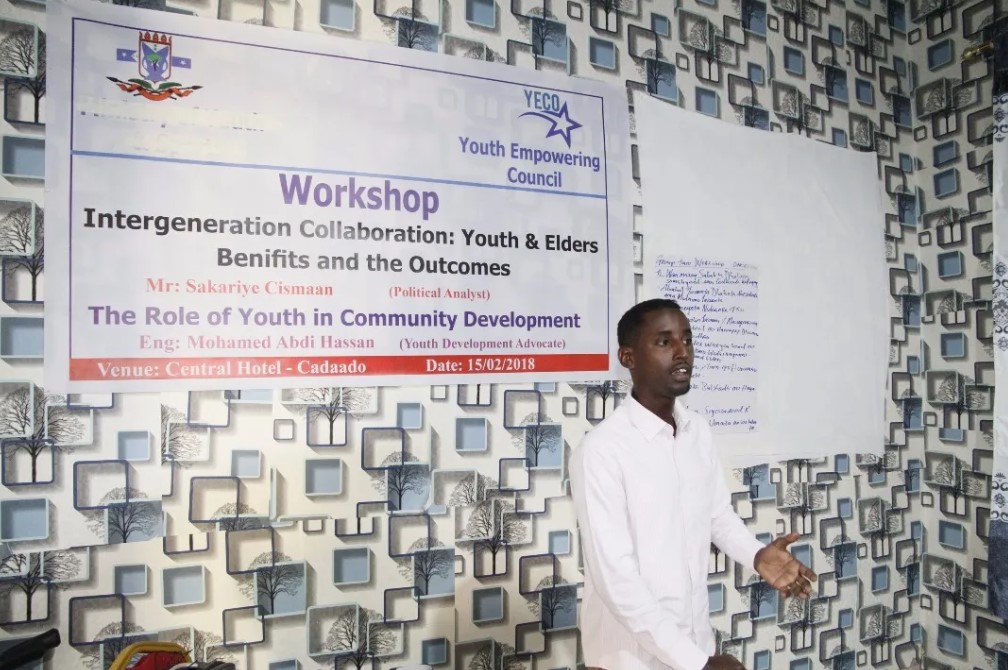
Outcomes of the Training Workshop
1. Participants realized the importance of inter generation dialogue and debated about how to sustain sessions such as this to address key challenging issues in the community.
2. Elders realized the importance of inter-generational dialogue and promised to consult with the youth for future endeavors.
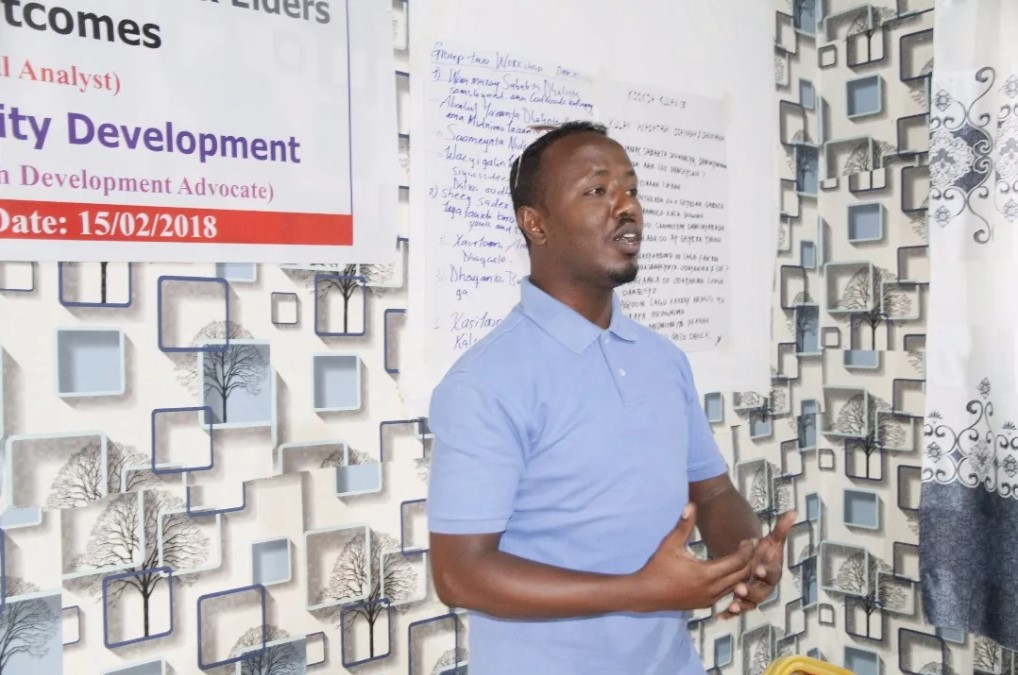
Photo group from some of the training workshop participants. Photo by Sahnun Ahmed
